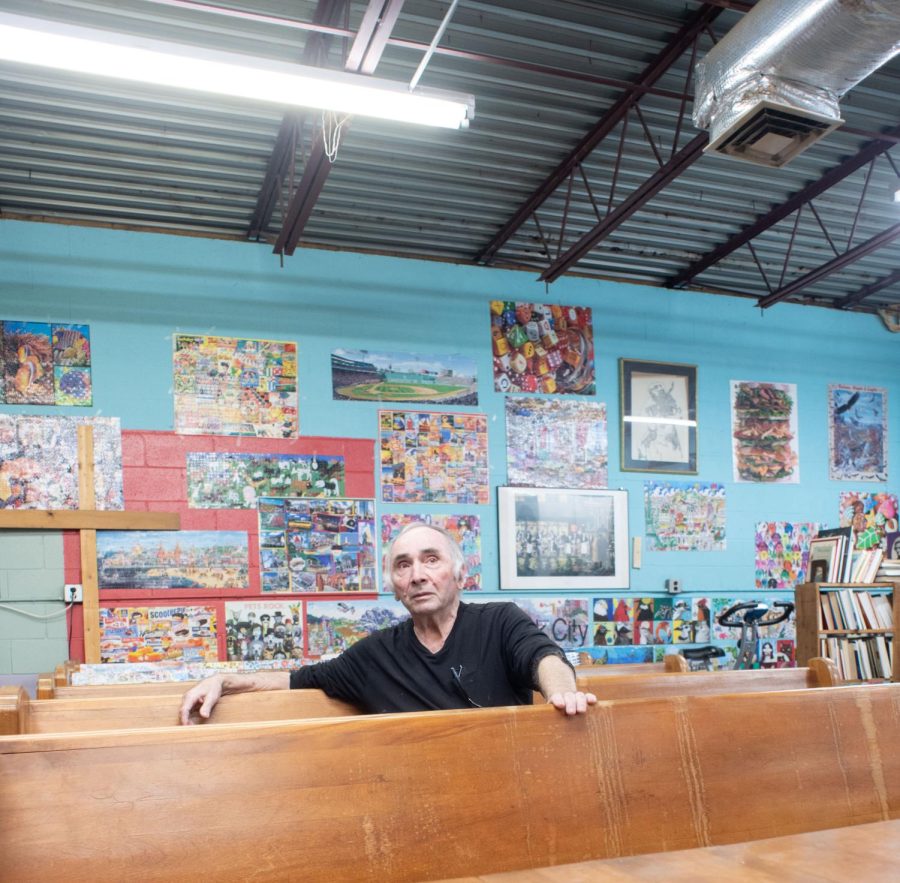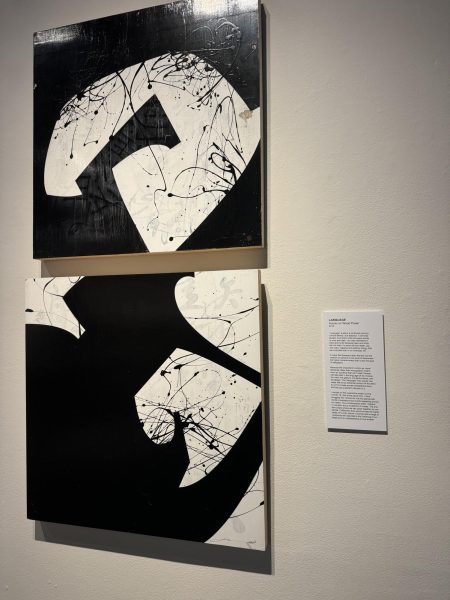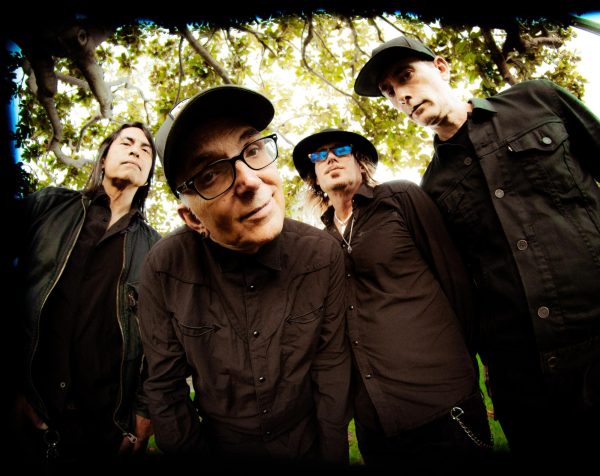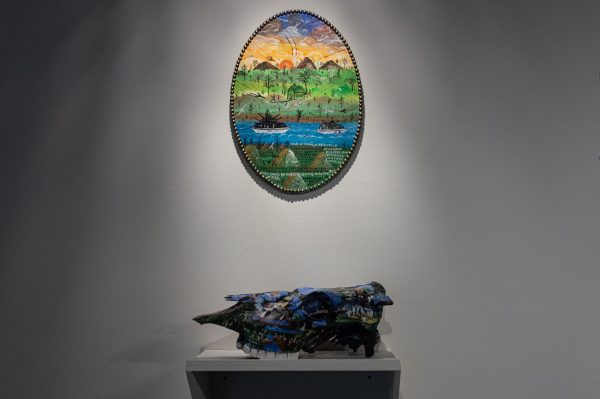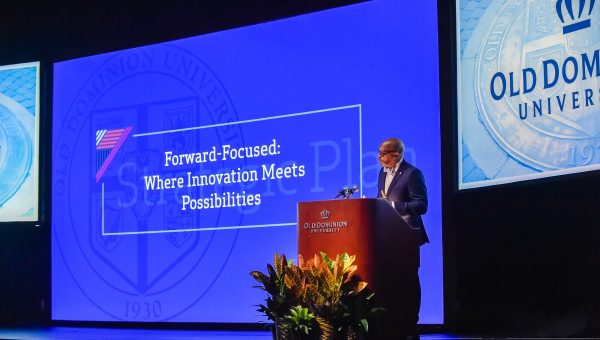The Bookbinder: Rewriting The History of a Community
Alain Roullet works as the owner and proprietor of Long’s-Roullet Bookbinders, inc. along with his wife Eileen. He has bound for Presidents Reagan, Carter, Obama, and Biden. He does not expect to retire or bequeath his business.
“We never expected to be bookbinders. Did you expect to be a journalist?”
On Monticello Avenue, just across from the zoo and only a few minutes away from the ODU campus, sits a white-bricked square storefront with a bright and welcoming sign that reads “Roullet Bookbinders, inc.” When you pass the front entrance, you’re greeted with glued puzzles dotting the walls and hanging from the ceiling, rows of old-ish books for sale, repurposed church pews in the back corner, and a table of free bibles above a display case of finely re-bound tomes.
Going further in and taking a right brings you to the workshop, where hundreds of coverless books are sorted by order number and spread out across many thousands of dollars worth of machinery. Turning back towards the entrance and veering to the left, you’ll find the owner’s office. It’s adorned with two opposite-facing desks, one-too-many filing cabinets, and two framed “Thank You” letters from former Presidents Ronald Reagan and Jimmy Carter hanging from a front-facing wall.
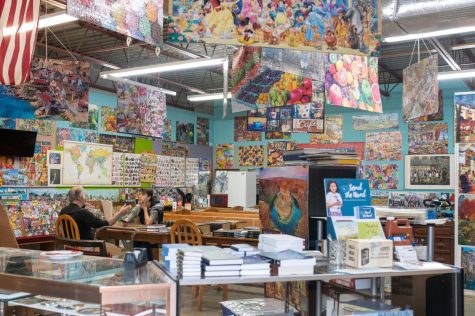
When first opened in 1975, the bindery was known as “Long’s Bookbinders and Religious Supply” after its founder, William H. Long Jr.. Long originally moved to Norfolk in 1941, only to be drafted into the Navy to fight on the Pacific Front. Well-known and appreciated in the Norfolk community, Long ran in 1979 for the Virginia House of Delegates as a Republican and acted for many years as the President of the Christian Booksellers Association (now the Christian Trade Association).
Due to their shared connections with local librarian and religious circles, Long and his associate Alain Roullet were able to conceive and build a bindery that would last decades, even exceeding its founder’s life. William H. Long Jr. died at the age of 91 in 2012 but sold his shares of the bindery to Roullet, who now runs the shop with his wife, Eileen.
Born in 1945 in Paris, Roullet spent his childhood in France, and at fifteen years old, embarked on a five-year sightseeing journey around the world. Following his trip, he was drafted into the French Navy for multiple years. After retiring, he successfully immigrated to the United States in 1967. He was not granted full US citizenship until about 1980.
After being fired from his second job at a restaurant for eating customers’ shrimp, Roullet was able to find a job as a document sorter on the lower floors of the United Nations in New York City. His future wife, Eileen, worked thirty floors above him “for several foreign attaches,” and the two met for the first time in the building’s lobby. After marrying in late 1968, they shifted between the east and west coasts before finally settling on Norfolk.
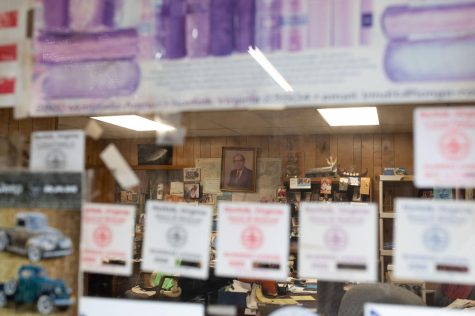
Roullet wasn’t sure why they moved to Virginia in the first place. “Maybe [it was] an act of God if you believe in that, but you cannot ever ask why,” he said. “Life moves on, wherever you are, you deal with that. There’s too many ‘whys,’ so that’s just it. It is what it is. America has the good, the bad, and the ugly, but I am fortunate to have always been with the good.”
For nearly fifty years, Roullet has bound manuscripts, bibles, and more for American presidents, universities, government organizations, and individuals — but times change.
The COVID-19 pandemic slowly bled the workshop dry of its employees, eventually leading to Alain and his wife, Eileen, becoming the only two staffed binders. “At our highest, we had [between] twelve [and] fourteen employees — some were seventeen year, some were twenty-one year. [My employees] were okay, though. It’s not like it happened in one night and ‘boom,’ you close. We saw it coming, and we had time.”
At its height, the shop “probably bound about a thousand books a week,” Roullet stated. “That was good, but our competitors were doing fifteen-thousand, so we were not at the same level. Right now, we can only get to maybe fifty, seventy-five books. It’s just me and my wife, you know.”
Roullet, at age 78, has never been concerned with technology. He continues to use a flip-phone and a very early brick of a Dell computer. “I don’t need a smartphone. Except for my son, nobody calls me,” he said laughing. “‘Pa, how are you doing?’ he says. ‘I’m fine,’ I say. ‘Good,’ he says, and then I get back to work.”
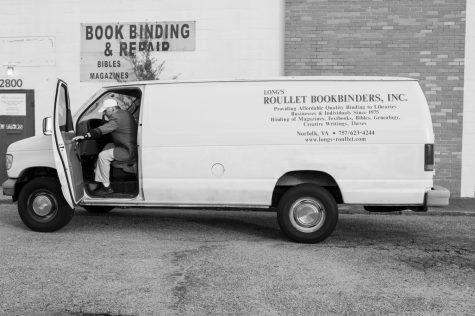
Eileen, who acts as Vice President of the business, is the store’s only bookkeeper through a smartphone and desktop combination. Her financial documents seemed to be both written and typed, and extremely meticulous. “We both do things that the other cannot,” Roullet said. “The business would not work without her, or without me.”
Most of the revenue generated through binderies comes from annual streams of college textbooks that need to be bound or re-bound. However, many colleges are no longer looking towards printed materials, with many opting to keep some textbooks entirely online. Despite having worked with colleges in smaller numbers, the Norfolk area provides unique opportunities to bind for NATO, the US Air Force, and the US Navy.
Looking around the workshop, it’s easy to notice more than just naval textbooks– although there are many. There’s also a seemingly endless number of family heirloom books that “might not be worth very much, but hold enough sentimental value to want it re-bound.” These heirlooms range from children’s books to two-hundred-year-old bibles, indicating a level of trust that the bindery has built with clientele over the years. However, Roullet has almost always placed his own trust in the spiritual.
The bindery has always had a faith-based connection, having sold religious supplies during its early years in the neighboring Long’s Religious Supply. Although the Supply is now a permanently-closed, empty storefront, the bindery still holds a few of its residuals.
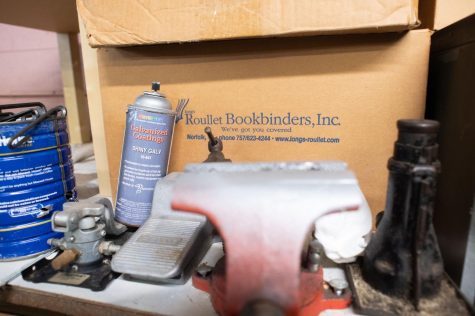
Roullet is a member of “The Gideons International,” which is the organization largely responsible for the pocket bibles found in hotel desk cabinets. He exercises his membership with free and multi-lingual pocket bibles at the front entrance.
Although religion was not so much a part of his youth, it has become a mainstay of his adult life. “When you start to have things you [can’t explain,] look for God. Look deep down in your heart, because that’s where your soul is. Start to figure out what’s going on — what you are, what you want to be, what you want to do.”
Roullet plans to drop the deed to the shop and the parking lot surrounding it before he dies, but does not plan to retire. “Eventually it’s gonna come — no man in my family [has] passed 80 years old, and I am seventy-eight. I just don’t want to do nothing. Work keeps my mind busy.”
Alain and Eileen Roullet built a life here in Norfolk with children, grandchildren, and a bookbindery that has served a community across generations.
Long’s-Roullet Bookbinders is open six days a week, and closed on Sundays.

Justice is an English Major with a concentration in Journalism in his Sophomore year at ODU. Outside of Mace & Crown, he writes and publishes freelance...
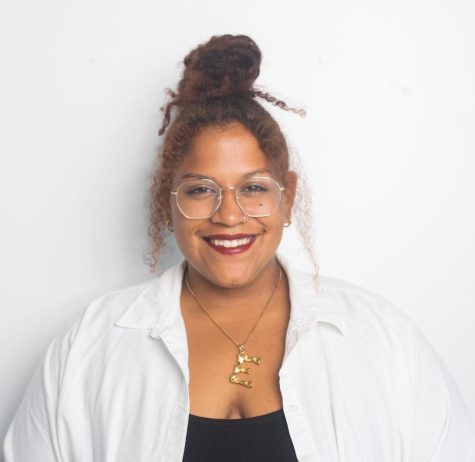
Elena Harris is a speech pathology major and photography minor graduating in the spring of 2023. Outside of the Mace and Crown, Elena enjoys the ODU experience...


